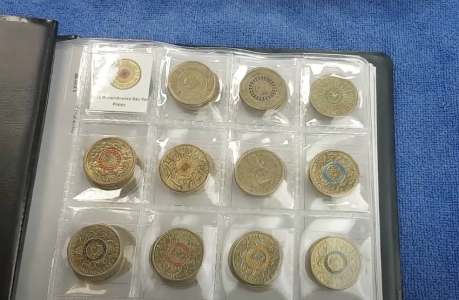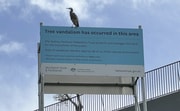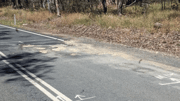Is your favorite hobby about to vanish? How Australia’s cashless shift could change everything
- Replies 0
Remember the thrill of scouring the footy oval after a big game, eyes peeled for a glint of silver or gold in the grass?
For generations, Aussies—young and old—have delighted in the simple joy of finding lost coins.
Whether it was a handful of lollies, a cheeky serve of fish and chips, or even a shiny new toy, those little treasures could turn a day around. But as Australia races towards a cashless future, this classic pastime is quietly fading into history.
For many of us, coin-hunting was more than just a way to score a treat—it was a rite of passage.
The best haunts? Footy grounds after the final siren, festival fields once the crowds had cleared, and sun-soaked beaches at the end of a busy summer’s day. There was a sense of adventure, a dash of luck, and the satisfaction of a pocketful of change.
Angus James, a modern-day prospector, remembers those days well. As a kid, he’d head out after local events and sometimes pocket up to $200 in lost coins—a small fortune for a young treasure hunter!
Now, Angus has turned his childhood hobby into a full-time job, searching for gold and relics across Australia. He still takes his own kids out in search of stray 20-cent pieces and the odd $2 coin, but admits the pickings are slim these days.

So, what’s changed? Quite simply, Aussies just don’t carry cash like they used to. Tap-and-go cards, mobile payments, and digital wallets have become the norm.
According to Angus, 'Now, when people go out and do it, they’d be lucky to find $5 each. Everything is cashless, so it’s making it hard to find the $1 and $2 coins.'
It’s not just about the money, either. The Royal Australian Mint says it’s impossible to know how many old coins are still out there, lost in parks, paddocks, and playgrounds.
But one thing’s for sure: the days of stumbling across a fresh $2 coin in the grass are numbered.
While modern coins are becoming rare finds, there’s still a world of history waiting beneath our feet.
Angus often explores footy ovals that have been in use for generations, unearthing pre-decimal coins under old trees—remnants of a time when people would rest in the shade and perhaps lose a coin or two.
Gold rush-era campsites are another favourite, where relics from Australia’s wild past still lie hidden.
Just last month, Angus discovered a Mexican reales coin—one of the legendary 'pieces of eight' tied to pirate folklore. Finds like these aren’t just valuable; they’re windows into the lives and stories of early Australians.
And here’s a fun fact: if you do stumble across a pre-decimal Aussie coin, you can still exchange it for its face value at most commercial banks. Not a bad little bonus for a day’s adventure!
For many, the real joy of coin-hunting isn’t in the value of the coins, but in the stories they tell.
'Searching for newer coins is a bit of a lost cause,' Angus admits. 'The good thing about finding old coins is you get a date, and you can have a think back to what it was like then. Now, you just don’t get that history with dropped coins.'
So, what’s next for Aussie treasure hunters? While the days of easy coin finds may be behind us, there’s still plenty to discover. Metal detecting clubs are thriving, with members searching for relics, jewellery, and even gold nuggets.
Technology has made it easier than ever to research old maps and pinpoint likely hotspots—just ask Angus, who shares his finds and tips on his Gold Coins and Relics Australia social media page.
Read more: 'One of the best ones to look for': Aussies on the lookout for limited-run coins

Did you or your kids ever go coin-hunting after a big event? Have you found any treasures in your own backyard? Or do you think Australia’s cashless future is a good thing? We’d love to hear your stories and memories—share them in the comments below!
For generations, Aussies—young and old—have delighted in the simple joy of finding lost coins.
Whether it was a handful of lollies, a cheeky serve of fish and chips, or even a shiny new toy, those little treasures could turn a day around. But as Australia races towards a cashless future, this classic pastime is quietly fading into history.
For many of us, coin-hunting was more than just a way to score a treat—it was a rite of passage.
The best haunts? Footy grounds after the final siren, festival fields once the crowds had cleared, and sun-soaked beaches at the end of a busy summer’s day. There was a sense of adventure, a dash of luck, and the satisfaction of a pocketful of change.
Angus James, a modern-day prospector, remembers those days well. As a kid, he’d head out after local events and sometimes pocket up to $200 in lost coins—a small fortune for a young treasure hunter!
Now, Angus has turned his childhood hobby into a full-time job, searching for gold and relics across Australia. He still takes his own kids out in search of stray 20-cent pieces and the odd $2 coin, but admits the pickings are slim these days.

The classic Aussie hobby of searching for lost coins is rapidly disappearing as Australia moves towards a cashless society, making it harder to find loose change. Image source: Phil Finds & Collects / Youtube. Disclaimer: This is a free use image used for illustrative purposes only and does not depict the actual person, item, or event described.
So, what’s changed? Quite simply, Aussies just don’t carry cash like they used to. Tap-and-go cards, mobile payments, and digital wallets have become the norm.
According to Angus, 'Now, when people go out and do it, they’d be lucky to find $5 each. Everything is cashless, so it’s making it hard to find the $1 and $2 coins.'
It’s not just about the money, either. The Royal Australian Mint says it’s impossible to know how many old coins are still out there, lost in parks, paddocks, and playgrounds.
But one thing’s for sure: the days of stumbling across a fresh $2 coin in the grass are numbered.
While modern coins are becoming rare finds, there’s still a world of history waiting beneath our feet.
Angus often explores footy ovals that have been in use for generations, unearthing pre-decimal coins under old trees—remnants of a time when people would rest in the shade and perhaps lose a coin or two.
Gold rush-era campsites are another favourite, where relics from Australia’s wild past still lie hidden.
Just last month, Angus discovered a Mexican reales coin—one of the legendary 'pieces of eight' tied to pirate folklore. Finds like these aren’t just valuable; they’re windows into the lives and stories of early Australians.
And here’s a fun fact: if you do stumble across a pre-decimal Aussie coin, you can still exchange it for its face value at most commercial banks. Not a bad little bonus for a day’s adventure!
For many, the real joy of coin-hunting isn’t in the value of the coins, but in the stories they tell.
'Searching for newer coins is a bit of a lost cause,' Angus admits. 'The good thing about finding old coins is you get a date, and you can have a think back to what it was like then. Now, you just don’t get that history with dropped coins.'
So, what’s next for Aussie treasure hunters? While the days of easy coin finds may be behind us, there’s still plenty to discover. Metal detecting clubs are thriving, with members searching for relics, jewellery, and even gold nuggets.
Technology has made it easier than ever to research old maps and pinpoint likely hotspots—just ask Angus, who shares his finds and tips on his Gold Coins and Relics Australia social media page.
Read more: 'One of the best ones to look for': Aussies on the lookout for limited-run coins
Key Takeaways
- The classic Aussie hobby of searching for lost coins is rapidly disappearing as Australia moves towards a cashless society, making it harder to find loose change.
- Prospector Angus James, who grew up searching for coins, says that while he once could find hundreds of dollars after events, these days people are lucky to find even $5.
- Although finding recently lost coins is now rare, discovering old coins—like pre-decimal currency and historical relics—still offers a window into Australia’s past and its people.
- Pre-decimal Australian coins can still be exchanged at most commercial banks for their face value, according to the Royal Australian Mint, even though the number of lost coins remains unknown.
Did you or your kids ever go coin-hunting after a big event? Have you found any treasures in your own backyard? Or do you think Australia’s cashless future is a good thing? We’d love to hear your stories and memories—share them in the comments below!







